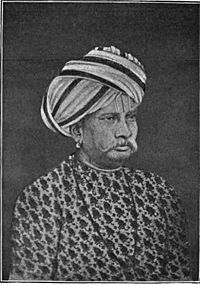Gazulu Lakshminarasu Chetty facts for kids
Quick facts for kids
Gazulu Lakshminarasu Chetty
C. S. I. |
|
|---|---|

A portrait of Gajula Lakshminarasu Chetty
|
|
| Born | 1806 |
| Died | 1868 |
| Occupation | Merchant |
| Known for | Political activism, publicist |
Gazulu Lakshminarasu Chetty (1806–1868) was an important Indian businessman and a strong voice for change. He was a merchant, which means he bought and sold goods. He was also a political activist, working to make things better for people in India under British rule.
Chetty started the Madras Native Association. This was one of the very first groups in India that worked for political change. He also launched The Crescent, the first newspaper in Madras owned by an Indian. Later, he became the second Indian person to join the Madras Legislative Council, a special group that helped make laws. Lakshminarasu Chetty was born in 1806 to a rich family in Madras. He used his business skills and money to help his community.
Contents
Early Life
Gazulu Lakshminarasu Chetty was born in 1806 in a place called Periamet in Madras. His family spoke Telugu. His father, Sidhulu Chetty, had a big business. They traded in indigo, dyes, and cloth. His father was also the first Indian member of the Madras Chamber of Commerce.
Back then, there were not many good schools in India. So, Chetty did not have a lot of formal schooling. But even when he was young, he was very interested in politics. He liked to join debating groups to discuss important topics.
His Business
After finishing his basic education, Chetty started working with his father. He learned the family business. Soon, their company was called Sidhulu Chetty and Co. They mainly sold handkerchiefs. The business grew quickly and became very successful.
When his father passed away, Lakshminarasu Chetty took over the company. He made it even bigger. A big event happened during this time: the American Civil War. This war stopped cotton trade between the United States and other countries. Chetty saw an opportunity. He made a lot of money by guessing how cotton prices would change.
Standing Up for Hindus
In the mid-1800s, Christian missionaries were trying to convert people in the Madras Presidency. They were doing this in public places. Many people felt that British government officials were helping these missionaries. It seemed like the British preferred Indian Christians for important jobs over Hindus. This made many Hindus upset. Chetty supported the Hindus and started protests against these conversions.
On October 2, 1844, Chetty started The Crescent newspaper. It was the first newspaper in Madras owned by an Indian. He started it to "improve the lives of Hindus." But the newspaper faced problems from the government right away. The government refused to print an advertisement for The Crescent in their own newspaper.
The government also planned a new law. This law would let a Hindu person who converted to Christianity still keep their family property. Hindus in Madras strongly disagreed with this. Chetty led them, and they sent a special request to the Governor on April 9, 1845. After many talks, the government finally dropped its plans.
Around this time, the Madras government tried to make the Bible a required textbook. They wanted to use it in schools like the Madras University. Students were often asked questions about Christian beliefs. If they did not know enough about Christian texts, they might not get government jobs. Hindus in Madras protested against these rules.
Chetty led a protest meeting on October 7, 1846. It was held at Pachaiyappa's College. At this meeting, they decided to send a letter to the leaders of the British East India Company. Their efforts worked! The plans to teach Christian beliefs in schools were stopped. In 1853, the government tried again to bring the Bible into school lessons. But Chetty, along with George and John Bruce Norton, stopped them once more.
Starting the Madras Native Association
In 1852, Chetty created the Madras Native Association. This group was a place for educated Indians to speak out against unfair actions by the British. It was the first Indian political group in the Madras area. Chetty was its first president.
At first, he wanted to start a branch of another group called the British Indian Association. But instead, he decided to form a completely new organization. P. Somasundaram Chettiar, a close friend of Chetty, became the Secretary of the group. The association often disagreed with Christian missionaries.
In 1852, the Madras Native Association sent a long list of complaints to the British Parliament. This list was read aloud in the House of Lords on February 25, 1853. It was read along with a request from people in Manchester. They wanted a special minister and council for India. They also wanted these leaders to report directly to the British Queen or King.
Chetty sent another request in 1855. More than 14,000 people signed this one. It asked the British Crown (the Queen or King) to take direct control of India. These requests helped to reduce the power of the British East India Company. Eventually, the British Crown took full control of India. The Madras Native Association closed down in 1867, a year before Chetty passed away.
Special Recognition
In 1861, Chetty received a special honor. He was made a Companion of the Star of India. Two years later, in 1863, he was chosen to join the Madras Legislative Council. He took the place of V. Sadagopacharlu, who was the first Indian to be part of this council. This was allowed by a law called the Indian Councils Act 1861.
Later Life
Chetty passed away in 1868. He had spent all his money helping with social and political causes.
 | Victor J. Glover |
 | Yvonne Cagle |
 | Jeanette Epps |
 | Bernard A. Harris Jr. |

